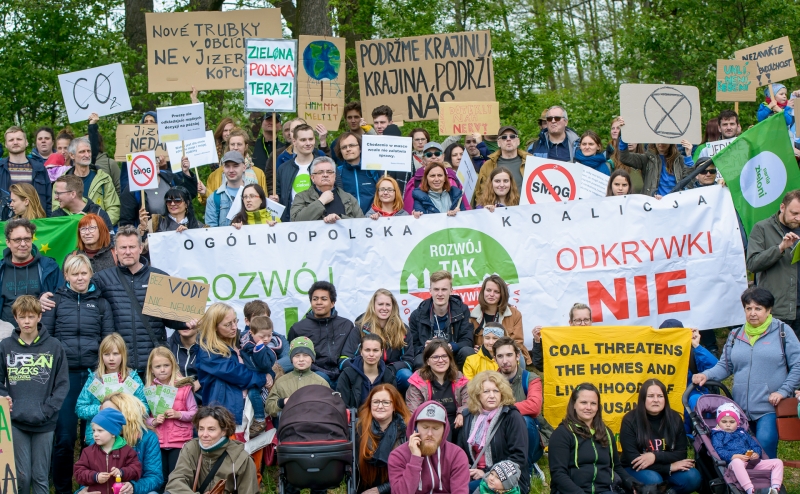Sunday 28 April at 2pm, citizens from Poland, Czech Republic and Germany created a human chain where all three national borders meet, to protest the expansion of PGE’s Turów lignite mine. Located in Poland’s Lower Silesia region, near the Czech and German border, the mine is being expanded by the Polish state-owned company to feed a new unit at the nearby Turów coal power plant, one of the oldest and dirtiest in Poland.
If the mine expansion goes ahead, lignite may be extracted until after 2044, threatening groundwater and agriculture locally, worsening public health across Europe, and exacerbating Poland’s already terrible impact on the global climate through its coal plants.
The peaceful demonstration was organised by the Czech Limity jsme my, the local Czech movement Chráníme vodu and Greenpeace Czech Republic, the Polish Foundation “Rozwój TAK - Odkrywki NIE”, Polish Society EKO-UNIA and German Greenpeace Oberlausitz. Local communities have signed a public letter to the Polish government calling for halting the planned expansion.
Polish state-owned coal company PGE is pressing ahead with the expansion of its Turów lignite mine, threatening human health, groundwater, agriculture, and our shared climate. It pumps out enormous quantities of groundwater - up to 200 million cubic tonnes per year - for its production. Altogether, that’s roughly a cube measuring 20km on each side. This causes a water crisis for about 30.000 inhabitants in border towns of the Czech Republic, who are also heavily impacted by the noise and dust pollution.
Local citizens from Poland, Czech Republic and Germany protested the expansion of the Turów mine, forming a human chain where all three national borders meet in order to highlight the transboundary impacts it has. The mine not only threatens groundwater and agriculture in the immediate region, its expansion and the burning of the coal excavated from it will have a significant impact on the health of people across Europe, as well as undermining efforts to address climate change.
Turow, like many Polish coal plants, is one of the worst offenders in the EU for both public health and CO2 emissions. According to our modelling, Turow is the 10th worst coal plant in the EU for its impact on human health, and 17th worst for CO2 emissions (2017 data). In total, seven out of the EU’s worst 30 coal plants for human health are in Poland (three of them are owned by PGE), as well as seven out of 30 in the EU in terms of CO2 emissions (four owned by PGE). PGE is the third worst coal company in terms of its impact on human health, with the Last Gasp report showing it was responsible for a modelled 1,180 premature deaths and EUR3.4 billion in total health costs in 2016.
“The Turów mine is insured by Generali, Ergo Hestia and the Polish subsidiary of German Talanx. The insurance contract expires at the end of 2019 and it is unlikely that either Generali or Ergo Hestia will extend it give the reputational risk they face by supporting this disastrous project. We are calling on Talanx, Hannover Rück and PZU to publicly announce that they will neither underwrite nor reinsure Turów open-pit mine.” - Kuba Gogolewski, Rozwój TAK - Odkrywki NIE
“Expansion of the Turow mine will cause massive droughts and depletion of water from local wells, and leave it only 300 metres from the nearest settlement. Local people will find their homes uninhabitable due to the noise and dust, and the pollution from the coal will spread far across neighbouring countries when it is burned. With climate change impacts already visible across the world, including the Czech Republic, the expansion of any coal mine and the continued long-term operation of any coal plant is utterly irresponsible.” - Nikol Krejčová, Greenpeace Czech Republic
Materials:
Photos (Greenpeace - Petr Zewlakk Vrabec)
Graphics: Last Gasp company card PGE



